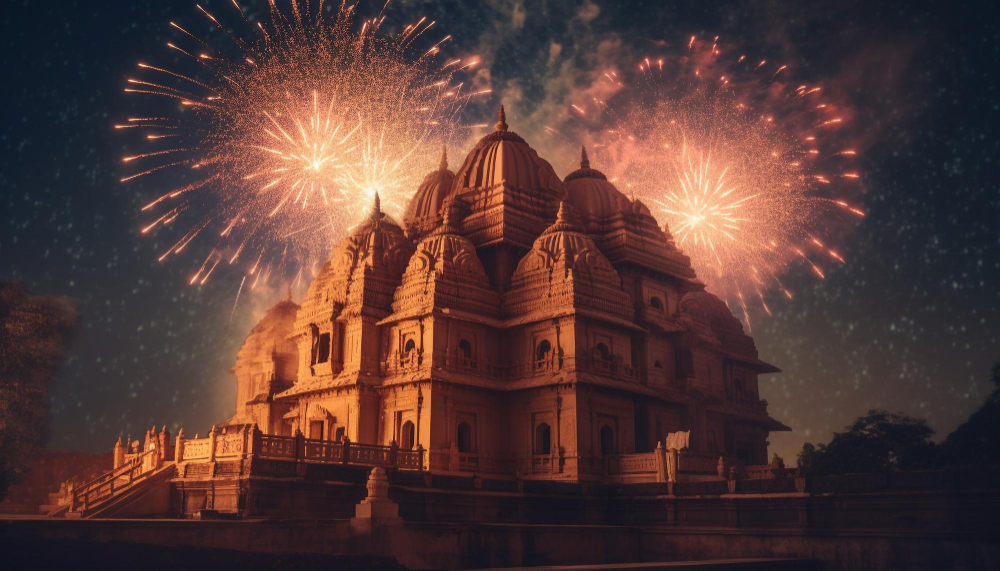In the heart of Uttar Pradesh, Ayodhya stands as a city steeped in history, mythology, and architectural grandeur. Renowned as the birthplace of Lord Rama, Ayodhya is not only a pilgrimage destination but also a treasure trove of tourist attractions that showcase the rich tapestry of India’s cultural heritage. Let’s embark on a virtual tour of Ayodhya’s captivating sights, highlighting the architectural marvels and historical wonders that make this city a must-visit.
Ayodhya Tourist Places: Exploring the Spiritual and Historical Marvels
1. Ram Janmabhoomi: The Epitome of Faith and History
At the heart of Ayodhya lies Ram Janmabhoomi, the sacred birthplace of Lord Rama. A site of both religious significance and historical importance, it has witnessed the ebb and flow of centuries. The revered temple stands as a testament to the city’s spiritual heritage and draws pilgrims and tourists alike. The serene surroundings and intricate architecture make it a place of tranquility and reverence.
2. Hanuman Garhi: A Fortified Abode of Devotion
Perched on a hillock, Hanuman Garhi is a fortress-like temple dedicated to Lord Hanuman. As a popular pilgrimage site, it offers panoramic views of Ayodhya and the Saryu River. The temple’s architecture, with its towering spires and intricate carvings, adds a touch of grandeur to the spiritual ambiance. Devotees and tourists often climb the 76 steps to seek blessings and enjoy the breathtaking vistas.
3. Kanak Bhawan: A Jewel of Architectural Elegance
Kanak Bhawan, also known as Sone-ka-Ghar, is a resplendent temple dedicated to Lord Rama and his consort, Sita. Its architecture is a blend of Rajput and Mughal styles, showcasing exquisite carvings and vibrant paintings. Legend has it that the temple was a gift from Queen Kaikeyi to Sita during their marriage. The opulence and artistry make Kanak Bhawan a jewel in Ayodhya’s architectural crown.
4. Treta Ke Thakur: Tracing Divinity Through Time
Treta Ke Thakur, also known as Raja Mandir, is an ancient temple believed to have been built by Raja Sagar. Dedicated to Lord Rama, this temple reflects the city’s deep connection to the Treta Yuga. The sanctum sanctorum houses the deities of Lord Rama, Sita, Lakshmana, and Hanuman. Pilgrims and history enthusiasts alike find solace in the spiritual aura and timeless charm of Treta Ke Thakur.
5. Nageshwarnath Temple: Where Legends Reside
Nageshwarnath Temple, dedicated to Lord Shiva, stands as an embodiment of Ayodhya’s eclectic heritage. According to folklore, Lord Rama performed the Shiva lingam installation here before embarking on his quest to rescue Sita. The temple’s architecture narrates stories of devotion and divine intervention, attracting devotees and tourists seeking a glimpse into Ayodhya’s rich mythological past.
6. Dashrath Bhavan: A Palatial Tribute to a King
Dashrath Bhavan, also known as the Fort of King Dashrath, is a monumental structure with historical significance. Constructed by King Dashrath, the father of Lord Rama, this ancient fort offers a glimpse into Ayodhya’s royal legacy. The architectural remnants and expansive courtyards evoke a sense of regality, transporting visitors back to an era of grandeur and valor.
In conclusion, Ayodhya, with its myriad tourist attractions, beckons travelers to immerse themselves in a cultural and historical odyssey. The architectural marvels and historical wonders narrate tales of devotion, mythological sagas, and the regal splendor that defines Ayodhya’s timeless charm. As you explore these sites, you’ll find yourself not just witnessing history but becoming a part of the living legacy that is Ayodhya.
Must Read: 10 Best Places To Celebrate Maha Shivratri Festival In India
Let’s delve into the top 10 frequently asked questions about Ayodhya’s tourist places, providing insightful answers for curious travelers.
Q: What are the must-visit tourist places in Ayodhya?
A: Key attractions include Ram Janmabhoomi, Hanuman Garhi, Kanak Bhawan, Treta Ke Thakur, Nageshwarnath Temple, and Dashrath Bhavan.
Q: Is Ram Janmabhoomi open to tourists?
A: Yes, Ram Janmabhoomi is open to tourists. It is a sacred site with historical significance, welcoming visitors from all walks of life.
Q: How can I reach Ayodhya?
A: Ayodhya is well-connected by road and rail. The nearest airport is in Lucknow, and regular trains and buses connect Ayodhya to major cities.
Q: What is the significance of Hanuman Garhi?
A: Hanuman Garhi is a fortress-like temple dedicated to Lord Hanuman, offering panoramic views of Ayodhya. It is a site of both religious and scenic importance.
Q: Are there any guided tours available in Ayodhya?
A: Yes, there are guided tours available that cover major tourist attractions, providing insights into the history and mythology associated with each site.
Q: Can tourists participate in religious ceremonies at these temples?
A: While tourists are welcome to visit and admire the temples, active participation in religious ceremonies is typically reserved for devotees.
Q: Are photography and videography allowed at these sites?
A: Photography is generally allowed at most tourist sites. However, it’s advisable to check with local authorities or guides for specific rules at each location.
Q: What is the best time to visit Ayodhya?
A: The months of October to March offer pleasant weather, making it the best time to visit Ayodhya. The climate is conducive for sightseeing and exploration.
Q: Are there accommodation options near these tourist places?
A: Yes, Ayodhya offers a range of accommodation options, including hotels and guesthouses, catering to various budgets.
Q: How long does it take to explore the major tourist places in Ayodhya?
A: A well-planned visit to Ayodhya, covering the major tourist attractions, usually takes around 2 to 3 days, allowing for a leisurely exploration of each site.
As you embark on your journey to Ayodhya, these frequently asked questions and their answers aim to provide you with valuable insights, ensuring a seamless and enriching experience as you explore the architectural marvels and historical wonders of this culturally vibrant city.
Must Read: Embarking on an Enchanting Journey in Varanasi: A 3-Day Guide to Spiritual Bliss by Radhika Pansare
